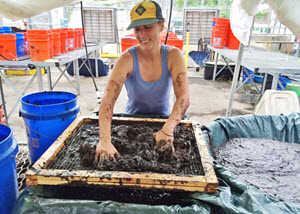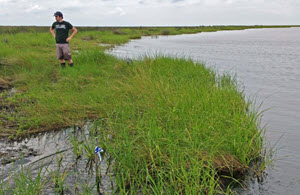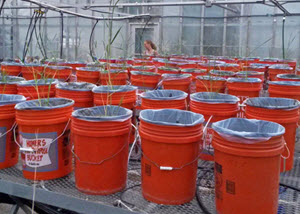
Postdoc Brittany Bernik strains marsh mud through a screen to prepare it for greenhouse experiments at Tulane University. (Photo by Sunshine Van Bael)
Living inside the roots and leaf tissues of marsh grass are bacteria and fungi known as endophytes that help promote plant growth. Since some endophytes can also help degrade petroleum that the plants absorb, it is possible they could be a natural tool to help clean up oil buried in marsh soils.
The Gulf of Mexico Research Initiative (GoMRI) recently awarded Dr. Sunshine Van Bael a grant to explore plant-bacterial symbioses as they relate to petroleum and dispersant pollution in coastal salt marshes. Her team is investigating how endophyte communities inside oiled coastal plants incorporate and amplify oil-degrading bacteria and if plants can deliver endophytic bacteria to polluted soils, hastening petroleum biodegradation. The team will use their findings to learn how plant-bacterial combinations may be used to quickly and safely restore oiled marshes.

Ph.D. student Stephen Formel helps collect soil at Bay Jimmy in Barataria Bay. (Photo by Brittany Bernik)
Preliminary research suggests that when coastal grasses are contaminated with petroleum, the bacterial communities in their tissues incorporate more taxa with petroleum tolerance and biodegradation capabilities. However, these processes are not well characterized. Improving our understanding about the mechanisms driving how grasses, symbiotic bacteria, and polluted soil interact could lead to the development of tools that use plant-delivered, naturally occurring bacteria to clean up polluted soils.
The team is conducting field work and controlled greenhouse experiments to identify how bacteria and bacterial communities behave in oiled and unoiled sites and determine how quickly the oil in soil and plant tissues are broken down. Next, they will investigate the bacteria’s interactions with oil droplets and oxygen and see if plant roots can deliver oxygen and bacteria to oil buried in the marsh soil.

The greenhouse experiment at Tulane University was set up in June 2016 to test how plants and their symbionts work together to clean up oil. (Photo by Stephen Formel)
“We know a lot about how bacteria break down oil in the ocean and on the beach, but we haven’t really investigated if and how this happens inside of the plant,” said Van Bael. “We hope to learn how plants and their microbial symbionts can influence oil spill clean-up, especially the possibility that the best tool to help clean up oil in buried marsh soils faster is plant-bacterial combinations.”
The project’s researchers are Sunshine Van Bael, Kyriakos D. Papadopoulos, Michael Blum, and Lisa Fauci of Tulane University, Claudia Gunsch of Duke University, and John Pardue of Louisiana State University. Their project is Chemical Evolution and Plant-Microbe Degradation of Petroleum in Saline Marsh Plants and Soils.
************
The Gulf of Mexico Research Initiative (GoMRI) is a 10-year independent research program established to study the effect, and the potential associated impact, of hydrocarbon releases on the environment and public health, as well as to develop improved spill mitigation, oil detection, characterization and remediation technologies. An independent and academic 20-member Research Board makes the funding and research direction decisions to ensure the intellectual quality, effectiveness and academic independence of the GoMRI research. All research data, findings and publications will be made publicly available. The program was established through a $500 million financial commitment from BP. For more information, visit http://gulfresearchinitiative.org/.
